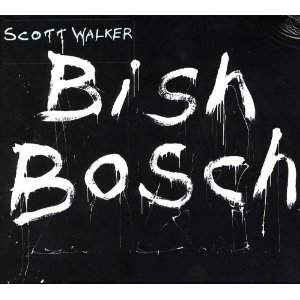Album Review: Scott Walker ‘Bish Bosch’
 |
Scott Walker has been making great music since the 1960s, but the similarities between his early work as a part of the Walker Brothers and the noise experiments he has crafted over the past couple of decades are almost none. Listeners who felt alienated by Radiohead’s transition from Pablo Honey to The King of Limbs know nothing of the confusion that would come over a Walker Brothers fan who picked up Bish Bosch.
His contemporary music is often said to defy expectation, but that isn’t the point. He’s not being weird for its own sake; he’s not a Lady Gaga-type, making accessible music with a few gimmicks to stand out from the crowd. Scott Walker is a true artist. The experience of listening to his work probably shouldn’t be approached with the intention to dance or sing along, but just to close one’s eyes and experience it. If that sounds too pretentious for you, this album is too pretentious for you.
The record is loaded with experimental percussion and atmospheric sounds, heavily featuring tense and maniacal strings which would be more comfortable in a horror movie. Things like emulated raindrops are more likely here than a guitar or piano. If it had to be compared to anything, it would fall somewhere between a film score and a radio play, but the most appropriate analog might be an opera.
Bish Bosch may seem like a very difficult record to review, but I don’t tend to agree with the idea that reviewers are the arbiters of what is objectively bad or good. I just want to give people the information to know what they are going to think of it. There are two basic archetypes for the way people are going to feel about this album, so I’m just going to summarize it twice– once from each of the perspectives that matter the most– and you can decide which of them sounds more like you.
The Art Student Says:
Bish Bosch is a brilliant look into the dark and macabre side of the human experience, just as beautiful as it is terrifying at times. Scott Walker crafts images in the minds of the listener in much the same way as a painter puts color to canvas, choosing sounds to elicit strong emotional responses, and selecting words not for their direct meaning but for the associations and feelings that they bring up inside of us all. I will be discovering new experiences within this record for years.
The Average Joe Says:
Bish Bosch is just weird, and hardly qualifies as music at all. Scott Walker kind of sounds like he’s reciting a dictionary at times, grabbing obscure words at random and singing with about the same vocal finesse of a five-year-old girl narrating her progress in making a sandwich. Even that would be more enjoyable than the seemingly random game of emo word-association he is playing here.
Some people aren’t going to get it. Others will get it, but won’t really care for it anyway because it goes a bit too far over the edge, beginning to feel like a parody of pretentious music. Given a chance though, the marriage of words and sounds– which can both be called intensely abstract poetry– will prove powerful and resonant, provided that you are open to it and not turned off by art that can be challenging.
If you listen to just one song to sample what this album has to offer, make it “Corpse De Blah,” a 10-minute song of sickness which is at least doubly palatable compared to the 20-minute-plus “SDSS14+13B.” On the lesser of two epics, Scott Walker takes the listener on a journey through sounds and phrases meant to paint horrific and uncomfortable images for the ear, with brief moments of real musicality that are somewhat more terrestrial than in other sections of the album. The orchestral arpeggios at four minutes create massive tension, but most of the song’s atmosphere is built through effects like popcorn, animal noises, and even farting. By the end of the song the chirping, frenetic sounds are relatively tangible, and even calming.
If I was just slightly more vague you could apply most of that description to the rest of the album as well. On “Pilgrim” rattling percussion encircles your speakers as Scott takes on a completely manic, desperate character. He has the same approximate outlook on life as your average angsty teen on “Phrasing,” singing “Pain is not alone” and “Here’s to a lousy life”. On the album’s closer, “The Day the ‘Conducator’ Died (An Xmas Song),” Scott visits a slightly simpler concept, sounding like a lonely man taking inventory of his mental health or starting an account on a dating site.
The songs feel like acts in a play, and the play itself is very strongly focused on a few core aesthetics which bring up a lot of the same sounds and feelings consistently. Strings are used to create suspense and fear, electric guitars sometimes make an appearance to provide a burst of aggression, and even awkward pauses of complete silence are utilized as needed. This album prefers to throw its more musical moments at you in bursts, as if to catch you off guard.
While it certainly is not for everyone, those with somewhat dark sensibilities and the patience to listen to music actively will potentially find that Bish Bosch is their album of the year, if not the decade. There is little out there to compare this to, and Scott Walker has no fear or limitation in crafting a work of this nature into a masterpiece.
Release Date: December 4, 2012
Image Courtesy of 4ad Records
